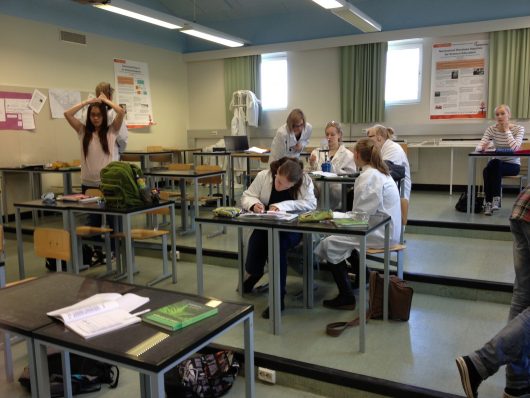These articles always annoy me because they focus on the top 1% of non-goverment schools. It's not the entire picture and doesn't acknowledge the good work that low fee paying non-government schools do in low socio-economic areas (and actually appears to patronise the work some of the "elite" schools do with marginalised students as well).Well, just this once...
The Morrison government’s overblown funding of private schools exacerbated inequality, undermined social cohesion and sabotaged cultural creativity.
By Elizabeth Farrelly.
Why Australia should ban private schools
The images are spectacular: slinky ovoid stairwells, glamorous foyers, expensive materials and exquisite detailing. The purpose-built music centre at Meriden girls school in Sydney’s inner west, opened by the New South Wales governor last month, is a collection of beautifully appointed auditoriums, recording studios and recital rooms carapaced beneath soaring roofs, with leafy courtyards and gracious loggias. Yes, music is glorious. And yes, prioritising girls helps rebalance Australia’s antediluvian gender equation. So isn’t this multimillion-dollar music emporium a good, culture-building thing?
It’s not. Actually, I’d go further. Not only is it not a good thing, but this lovely building – and the hundreds of others like it proliferating in the manicured grounds of private schools across the country – is a very, very bad thing for us all. Why? Because these immense educational ostentations represent the debasement of all that is best and proudest in Australian culture.
Education is the key to civilised life – which is why, if I could change one thing about Australia, it would be this. I’d ban private schools. Not because such schools are necessarily bad, nor do they necessarily produce bad people. Rather, private schools are systemically toxic to the kind of vibrant and inventive future we desperately need to create.
At the heart of this debasement is a collective amnesia. After three decades of obediently swallowing the neoliberal Kool-Aid, we’ve forgotten we’re more than just individuals, haggling in life’s marketplace for the smartest buys and most lucrative sells. We’re not just consumers. We’re also citizens. And to create citizens, as opposed to market hagglers, our system must radically change. To generate a culture that maximises talent, nurtures creativity and builds a better world, all schools must be excellent, revered and freely open to all. But, but… you’ll say. What about the good ones? What about choice? What about freedom? The answer is the same as the vaccination answer. It’s not just about you.
Most obvious is the equity argument. The statistics are legion but, in essence, while the country’s top 50 private schools have assets valued at $8.5 billion, plus millions in annual profits, public schools don’t even have guaranteed funding for heating and cooling. While private schools happily invest tens of millions on palatial new facilities – such as Shore’s $52 million pool and physical education complex, Melbourne Grammar’s $30 million science and technology hub and Cranbrook’s vast new $132 million sandstone-clad, turf-topped pool and athletic centre – public school kids can’t even count on security fences or hygienic bathrooms. While the wealthiest private school, Sydney’s Shore, posted a surplus in excess of $23 million in 2019, public school parents must fundraise for air-conditioning or shelter from rain. While private schools’ assets rose by 42 per cent between 2015 and 2019, easily outstripping the benchmark Australian stock index, public schools barely have assets. For most, even modest drama, sporting or performance facilities are on the never-never.
Covid-19, too, showed class preference. While private schools could temperature-test all kids upon entry and separate them during lessons, public school classrooms were already full to bursting, with no capacity for separation. Electronic testing was out of the question.
This obscene ostentation exacerbates an already dramatic class divide. But even more galling is how all this has been actively fostered by public funding. Over the four years to April, the Morrison government directed an extra $10 billion of funding to private schools, while underfunding public schools by at least $6.5 billion every year. So children who were already networked into the ruling class, already secure in their future, receive yet more cushioning at considerable public expense, while those less privileged drift further down the ladder.
Naturally, this suits entrenched self-interest – not just of individuals and dynasties, but of the schools themselves, which have become increasingly corporatised. The more a school can hike its fees, the more it grows its reputation as a prestige establishment, enhancing its attractiveness to silver-spooners and its likelihood of producing the bankers and stockbrokers who can be tapped for named halls and other philanthropic status-funding in the future. That’s a nasty little cycle all by itself, a system of ever-more-entrenched born-to-ruleism that both relies on and nurtures the clubbiness of Australian culture. It’s a system in which the children of the wealthy, and their children, grow up to regard the rest as plebs and pass around the lucrative sinecures, board memberships and ministerial posts between them. There’s a name for this: a caste system.
Three arguments are typically used to justify private schools. One, choice. Two, burden. And three, quality. Each is only valid – and sometimes barely that – from the viewpoint of individual rights. When the case is viewed through a culture-making lens, the answer is obvious.
Taking these arguments in reverse order – first, quality. Our culture is increasingly in thrall to the belief that if you don’t, or can’t, cough up the $30,000–$45,000 per year per kid for private schooling, you’re a bad parent. Your child, forced instead to attend a public school, will miss out. This is far from proved, however. David Gillespie’s book Free Schools details his research finding that, for all the glamorous facilities and emerald lawns, private schools don’t deliver better education. Once you correct for socioeconomic advantage, even the most expensive schools add little to educational outcome.
The burden argument relies on the notion that the rich, by removing their children from the public system, are somehow lifting a burden from the public’s shoulders. This allegedly frees up funding to support more needy kids – some of whom, out of the goodness of their hearts, the private schools also pluck up with scholarships. What’s really happening here is a creaming-off of talent, money and energy to sustain the schools’ placing in the academic or sporting leagues, further reinforcing their status and income while leaving the public sector impoverished.
The choice argument implies that education is like shampoo, or a phone plan. The consumer should be free to select whichever product they like and can afford. But with education, such choice is illusory. It’s not as if you can run a controlled experiment with your kid in this or that school, then revise your choice accordingly. Plus, the choice is not equal: some have it, most do not.
And even consumer behaviour has moral content. And here, the true disaster of the private-school hegemony becomes apparent. Choosing a shampoo hinges only partly on individual rights and desires, determined by, say, price, fragrance and softness. It’s also about wider responsibilities, such as avoiding toxic chemicals, harm to orangutans and single-use plastics. Although education is vastly more important, we’re oddly reluctant to consider what our wider responsibilities are in this arena: what kind of culture we want, or need, to create.
From this viewpoint, and especially when combined with inequality, the right to choose looks less like freedom and more like separatism. Teaching our children wealth- or religion-based separatism before they outgrow their booster seats can only engender hatred and distrust. Indeed, when one side talks freedom but keeps most of the wealth and power to itself, the whole system comes uncomfortably close to the ideals of “separate development” – or apartheid.
Quite apart from the injustice, such a system wastes talent. And talent, given the kind of future we’re likely confronting, is not something we can afford to waste.
Further, the effect of this system, in combination with a million-dollar mortgage, is to tie parents so relentlessly to the treadmill that they have no time to look up, much less query, create, volunteer or discuss. This makes for a society of stifling dullness and conservatism – the opposite of the cultural agility we’re going to need.
By converting all schools to public schools, diverting even half of their wealth and energy to the public sector, the quality of public education could be transformed. Teachers could be properly paid, so that teaching in the public system would no longer be a sacrifice and could therefore require high-level tertiary qualifications. Together, these changes would bestow on public school teaching the reverence it deserves. Nationalising schools would also channel parental and student energies into a system that would encourage peer-to-peer learning – enriching and empowering all, instead of the few.
If you think Australia incapable of such bold steps, consider John Howard’s gun laws, which took us from a dangerous confusion to a country whose policy is now held up as an exemplar to the United States. And if you think such dramatic school reform is impossible, look at Finland.
Forty years ago, Finland had an education system much like ours – a highly competitive mix of public and private schools that, despite the hype and the choice, produced worsening test scores. The then education minister, Professor Pasi Sahlberg (now deputy director of the Gonski Institute at UNSW Sydney), took a radical approach. Nationalising all schools, he required all teachers to be highly qualified, paid and respected. At the same time, he reduced children’s study hours and homework and extended holidays. Within a few years, Finland shot to the top of the league tables – and there it has remained, more or less, ever since.
Why wouldn’t we do the same?
I get the underlying message about trying to improve equity and outcomes for all, but it would be nice to read an article that is actually attempts to show some level of balance and critically assess the entire state vs. non-government landscape, not the headline grabbing items that allow them to cry "woe is us". Its disingenuous.






